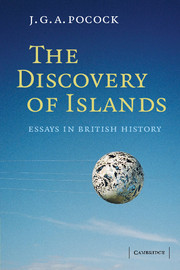Book contents
- Frontmatter
- Contents
- Preface and acknowledgements
- Note on bibliographies
- PART I THE FIELD PROPOSED
- PART II THE THREE KINGDOMS AND THE ENGLISH PROBLEM
- 3 The field enlarged: an introduction (2004)
- 4 Two kingdoms and three histories? Political thought in British contexts (1994)
- 5 The Atlantic archipelago and the War of the Three Kingdoms (1996)
- 6 The Third Kingdom in its history (2000)
- PART III EMPIRE AND REBELLION IN THE FIRST AGE OF UNION
- PART IV NEW ZEALAND IN THE STRANGE MULTIPLICITY
- PART V BRITAIN, EUROPE AND POST-MODERN HISTORY
- Bibliographies
- Index
4 - Two kingdoms and three histories? Political thought in British contexts (1994)
Published online by Cambridge University Press: 05 June 2012
- Frontmatter
- Contents
- Preface and acknowledgements
- Note on bibliographies
- PART I THE FIELD PROPOSED
- PART II THE THREE KINGDOMS AND THE ENGLISH PROBLEM
- 3 The field enlarged: an introduction (2004)
- 4 Two kingdoms and three histories? Political thought in British contexts (1994)
- 5 The Atlantic archipelago and the War of the Three Kingdoms (1996)
- 6 The Third Kingdom in its history (2000)
- PART III EMPIRE AND REBELLION IN THE FIRST AGE OF UNION
- PART IV NEW ZEALAND IN THE STRANGE MULTIPLICITY
- PART V BRITAIN, EUROPE AND POST-MODERN HISTORY
- Bibliographies
- Index
Summary
Dr Mason has edited, and powerfully helped in writing, a series of essays which in the first place examine the political discourse concerned with a ‘matter of Scotland’. The period is the sixteenth century and the medium of discourse is print. We are therefore looking at an age in which historians once conventionally located the emergence of ‘national monarchies’, and indeed ‘nation’ and ‘monarchy’ are organizing concepts in the discourse before us. In such an age it would be reasonable also to look for the emergence of canons of authoritative literature, invented either by contemporaries or in retrospect by subsequent authors and authorities. Canons are to be mistrusted, lest they come to control our minds as they may have controlled those of others; nevertheless, in organizing a new field of study – and we are still exploring ‘the unknown subject’ – it can be of experimental value to construct a canon and then enquire if it needs to be deconstructed. Let it be suggested, then, that scholars are now in a position to organize (should they decide to do so) a ‘history of Scottish political thought’ around a canon or succession of prominent authors, minimally consisting of John Mair, Hector Boece, John Knox, George Buchanan, James VI (and I), Sir Thomas Craig and (if we reach as far as the covenanting period) Samuel Rutherford.
- Type
- Chapter
- Information
- The Discovery of Islands , pp. 58 - 76Publisher: Cambridge University PressPrint publication year: 2005



